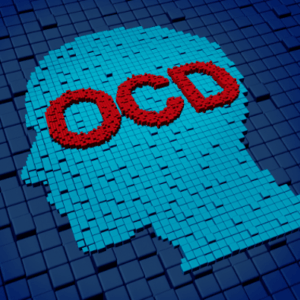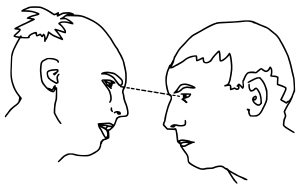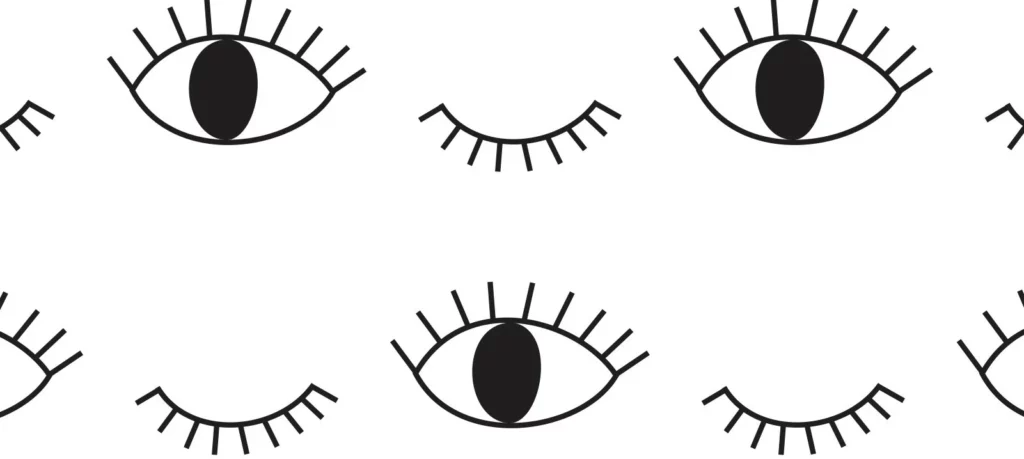Do you ever feel like you’re being watched? That someone is staring at you, even when there’s no one around? If so, you might be experiencing OCD staring. This is a unique form of obsession that can be quite unsettling. In this article, we will discuss the symptoms and causes of OCD staring, as well as treatment options.
Contents
What Is OCD Staring?

OCD staring is a form of obsession where the sufferer feels like they are being stared at, even when there is no one around. This can be a very unsettling feeling, and it can cause the sufferer to feel paranoid and on edge.
Another form of staring OCD is when the sufferer feels a persistent need to stare at others, especially their genital areas or the breasts, even if the person doesn’t want to be stared at. This can make for awkward or uncomfortable situations, to say the least.
Causes of OCD Staring
There is no one definitive cause of OCD staring. However, there are some possible explanations.
- One theory is that it’s a way for the brain to relieve anxiety or stress. By fixating on the act of staring, the sufferer can avoid thinking about whatever is causing them anxiety or stress.
- Another possibility is that it’s a form of self-harm. The act of staring can be a way to punish oneself for perceived wrongdoings. This might be done in an attempt to make oneself feel better about a past event or situation.
- Genetic predisposition plays a significant role in transmitting disorders. If you have a family member who suffers from OCD or another mental health condition, you are more likely to develop OCD staring.
- A major life event, such as the death of a loved one, can also trigger this condition.
- If you have experienced trauma, such as abuse or violence, you may be more likely to develop OCD staring.
- People with pre-existing anxiety disorders are more likely to develop these compulsions.
- If you have a family member who suffers from OCD or another mental health condition, you are more vulnerable to this disorder.
- Major and stressful life events, such as the death of a loved one, can trigger OCD staring.
- If you have experienced trauma, such as abuse or violence, you may be more likely to develop OCD staring.
- Lastly, it could be a form of OCD that’s triggered by seeing someone else engage in the act of staring. This is known as ” contamination OCD.” In this case, the sufferer becomes obsessed with the idea that they will become contaminated by what they have seen.
Symptoms Of OCD Staring

There are many different symptoms of OCD staring, but some of the most common ones include:
- Feeling like you are being stared at, even when there is no one around
- Feeling paranoid and on edge
- Avoiding situations where you feel like you might be stared at
- Shying away from making eye contact with others
- Experiencing anxiety or stress in social situations
- Feeling self-conscious
- Fearing coming off as creepy or invasive
- Constantly checking to see if someone is staring at you
- Paranoia and anxiety
- Feeling on edge all the time
Effects Of OCD Staring

This disorder can have a major impact on your life.
- It can make it difficult to socialize and interact with others.
- You may start to avoid situations where you feel like you might be stared at, which can lead to isolation and loneliness.
- Your work or school performance may suffer as well.
- One may start avoiding social interactions to stay away from uncomfortable and overwhelming situations. This can lead to social isolation.
- If you’re constantly worried about being stared at, it’s hard to focus on anything else. This can lead to problems with concentration and memory.
- OCD staring can also cause relationship difficulties. If you’re always checking to see if your partner is staring at you, it’s hard to relax and enjoy time together. This can lead to tension and arguments.
Treatment Options
If you think you may be struggling with this condition, it is important to reach out for help. This condition can be very difficult to deal with on your own. Remember, there is no shame in seeking further treatment for a mental disorder!
Therapy
OCD staring is typically treated with a combination of medication and therapy. The exact treatment plan will vary depending on the severity of the condition, but some common treatments include:
- Cognitive behavioral therapy: This is a type of therapy that helps the sufferer to change their thinking patterns and behaviors.
- Exposure and response prevention: This is a type of therapy that involves gradually exposing the sufferer to their fears and then teaching them how to cope with the anxiety.
- Medication: Many different types of medication can be used to treat OCD staring, including antidepressants, anti-anxiety medication, and antipsychotics.
OCD staring is a form of OCD that characterizes by the compulsive act of staring. It can be extremely distressing and have a major impact on your life.
If you think you might be suffering from this disorder, it’s important to seek professional help. Mantra Care offers accessible and affordable mental health assistance from all around the world.
Self-Help Tips
There are also some things you can do at home to help manage your OCD staring. Some self-help tips include:
Identifying your triggers: Make a list of the things that trigger your symptoms. This can help you to avoid them in the future.
Practicing relaxation techniques: This can help to lower your anxiety levels and make it easier to cope with your symptoms.
Challenging your thoughts: When you have an OCD staring compulsion, take a step back and question whether it’s true. For example, just because you’re feeling paranoid doesn’t mean that someone is staring at you.
Building a support system: Find friends or family members who understand what you’re going through and can offer support and understanding.
Exposing yourself to your fears: Gradually expose yourself to the situations and people that make you anxious. This will help you to build up tolerance and confidence.
Conclusion
OCD staring is a unique and distressing form of OCD that can have a significant impact on your life. If you think you might be suffering from this disorder, it’s important to seek professional help. There are also some things you can do at home to help manage your OCD staring, including identifying your triggers, practicing relaxation techniques, and challenging your thoughts. Finally, building a support system can be extremely helpful in dealing with this condition.
If you are looking for affordable Online OCD Counseling MantraCare can help: Book a trial OCD therapy session


